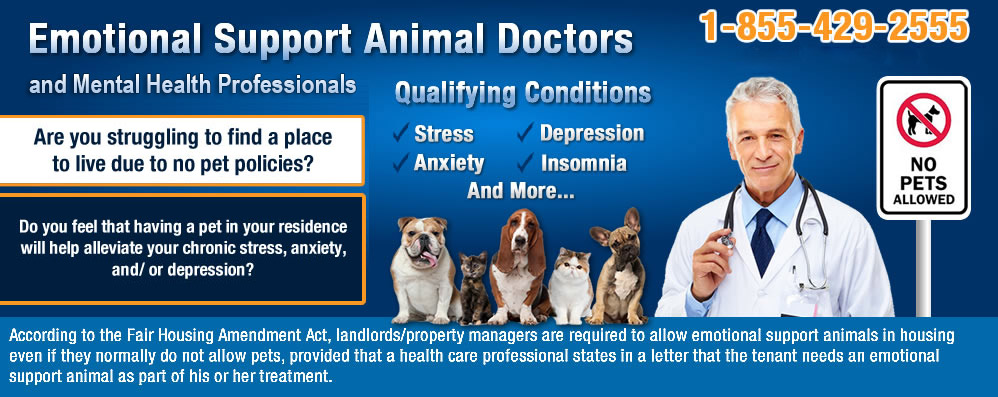Contents
- 1 Can Your Landlord Reject Your ESA?
- 1.1 The Fair Housing Act
- 1.2 What Do I Need So My ESA Can Live With Me?
- 1.3 How Do I Get My ESA Approved By My Landlord?
- 1.4 How Will A Landlord React to My ESA Request?
- 1.5 Can My ESA Be Legally Denied?
- 1.6 What Do I Do If I Feel I Have Been Illegally Denied?
- 1.7 Can My ESA Be Evicted?
- 1.8 Your ESA Letter
Can Your Landlord Reject Your ESA?
Many homes available for rent have a no pets policy. Some have a pet policy clause that limits the types and sizes of pets that are allowed to live on the property, and most of those include a deposit or fee.
If you have an ESA letter for your emotional support animal (ESA), property owners/landlords must make reasonable accommodations for your ESA. And they have to do so at no charge to you. Your ESA is protected under federal law by the Fair Housing Act (FHA).
The Fair Housing Act
Under the FHA, a property owner/landlord cannot refuse a tenant based only on disability. They must make reasonable accommodations for individuals with disabilities. Allowing a tenant with a valid ESA letter to have their ESA in their rental unit is considered a reasonable accommodation. Refusing an ESA is refusing their owner, which is a form of discrimination.
What Do I Need So My ESA Can Live With Me?
The only document you need is a properly executed ESA letter from a licensed mental health professional. Your ESA is not required to be registered to any database. You do not need an ID card or certificate. Although on the internet you can find a variety of registration and certification sites claiming that you need their listing or paperwork for your ESA, you don’t. All you need is an ESA letter that contains the required information.
How Do I Get My ESA Approved By My Landlord?
Once approved for the rental, request a waiver of the no pets policy and present your ESA letter as verification of your need for your emotional support animal. Make your request in writing.
How Will A Landlord React to My ESA Request?
Assuming that you meet the qualifying standards to be a tenant — credit checks, eviction history, criminal history, security deposit, etc. — a landlord/property owner who understands FHA guidelines will typically want answers to the questions:
- Does the tenant have a disability?
- Does the animal assist with or alleviate this ability?
Those two questions are officially answered with your ESA letter.
Once the criteria above have been met, the landlord/property owner will consider if the request requires a fundamental alteration to the nature of the property or causes an undue financial hardship or administrative burden. If not, the request is considered a reasonable accommodation.
If your landlord/property owner accepts your request, get that acceptance in writing.
Be Prepared
When requesting a waiver of the no pets policy, understand that the landlord/property owner might not be aware of — or familiar with — laws such as the FHA. They might also not be aware that your animal is an ESA. Be understanding and courteous. Often with a friendly exchange of information and a little education, accommodations can be made in a friendly and constructive way.
Can My ESA Be Legally Denied?
Yes, there are a few situations, including:
- The rental property has 4 or fewer units and the landlord lives in one of them.
- The rental property is a single family house rented without a real estate agent or broker. The owner of the house cannot own more than 3 single family houses.
You might also run into defendable resistance if you are trying to bring in an ESA that is obviously inappropriate for the rental unit, for example, a llama into a small studio apartment with no outdoor space. Although this is not specifically mandated like the two situations above, the legal system might see a problematic size differential the same way that a property owner/landlord does.
What Do I Do If I Feel I Have Been Illegally Denied?
The first step is asking your landlord/property owner for a formal rejection letter.
Next, reply to that rejection, in writing, that you have provided the necessary documentation (ESA letter). Consider including a statement that they are rejecting a reasonable accommodation request and that you are planning to file a complaint with the Department of Housing and Urban Development (HUD).
This might be enough to get your landlord/property owner to review the law and change their mind. Typically landlords/property owners will avoid violating federal housing laws and disability rights. If not you will have to make a decision on whether or not to file a complaint with HUD.
Although this method has been used in the past, we are not lawyers and cannot offer legal advice.
Can My ESA Be Evicted?
Your property owner/landlord may be able to have your ESA removed if it disrupts other tenants’ ability to enjoy their home or if it poses a direct threat to others. These allegations are serious legal allegations and are typically not made if you take care of your pet appropriately, for example:
- You clean up after your ESA so their waste does not pose a health risk.
- You train your ESA so it is well behaved in public — no lunging or biting.
- You do not allow incessant barking.
Your ESA Letter
An ESA letter is the only documentation you need to properly request a waiver of the no pets policy so you can live with your emotional support animal. Thousands of Americans have found the DOGtor to be a simple, fast and affordable way of getting a valid ESA letter that meets FHA requirements.













